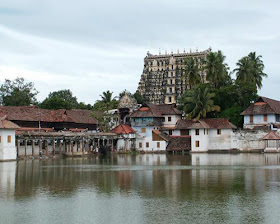It is the world’s first airport to run completely on solar energy
 |
| An aerial view of the solar field. Cochin International Airport Ltd (CIAL) currently uses 48,000 units of power it generates. (Akhel Mathew/Gulf News) |
Akhel Mathew, Correspondent
Kochi, Kerala: The next time you wing into the Kochi airport in Kerala, on the southern tip of India, you will have another visual treat in addition to the majestic coconut palms, the meandering waterways and the multiple hues of lush green vegetation.
To those pretty sights have been added thousands of solar power panels spread over a 18-hectare area, combining a visual treat with the promise of clean energy. The achievement makes the Cochin International Airport Ltd (CIAL) the world’s first airport to run completely on solar energy, authorities claim.
The airport company hopes to generate 18 million units of power a year from its 12 megawatt generation facility on the airport premises. That will also cut 175,000 tonnes of carbon emissions over the next 25 years, according to CIAL officials. That, they say, is the equivalent of planting three million trees or running a car for 1.2 billion kilometres without the use of fuel.
“It has been a matter of satisfaction for us to be producing our own requirement of power. I am seeing the fruits of solar energy right in front of my eyes,” V.J. Kurian, managing director of CIAL told Gulf News.
“On an average, we produce about 52,000 units of power a day, and we consume about 48,000 units daily. The power produced is fed into the grid of the Kerala State Electricity Board, and we can draw power from the grid when the solar panels go to sleep at night,” Kurian says.
For a state that is perennially short of power, that is a significant window of opportunity. Kerala relies mainly on hydro power, with the Idukki hydroelectric station being its flagship power producer.
“It would be a good idea to add generation capacity at Idukki in the night, and rely on solar power during the day”, says Kurian, who feels Kerala should embrace more of solar energy.
The solar energy facility at CIAL was established by the German technology and services giant, Bosch. The Bosch Energy and Building Solutions team reportedly expects an average daily power generation of 50,000 units.
 |
| Kerala, India |
“We invested Rs51.70 million [Dh2.86 million] per mega watt, or about Rs620 million for the 12 mega watt solar plant. We hope to break even in about five and a half years, but more than that, we realise it is a viable model for power generation,” Kurian says.
What is significant is that while different airports around the world have used solar energy to partially meet power requirements, CIAL is the first to generate all the power that is needed to run the airport, and even produce a little bit of surplus energy, point out CIAL officials.
 |
| Kerala state, India |
The 21-year-old airport company has two major subsidiaries, the Cochin International Aviation Services Limited (CIASL) and Cial infrastructure Limited. It also owns an 18-hole golf course and a trade centre.
Opening the solar energy unit at the airport, chief minister Oommen Chandy pointed out the need for more profitmaking, forward-looking ventures like CIAL. The airport company appears focused on a similar ambition: It hopes to be a Rs30-billion company by 2030. The solar farm that it has just established, not too far from the paddy fields nearby, reflects the sunny side of the airport company that has kept soaring since its take-off in the mid-1990s.
Congratulations CIAL, you obviously have some very intelligent people at the top.
No comments:
Post a Comment